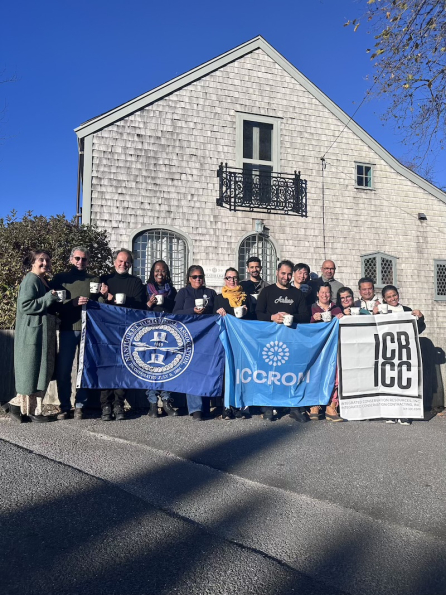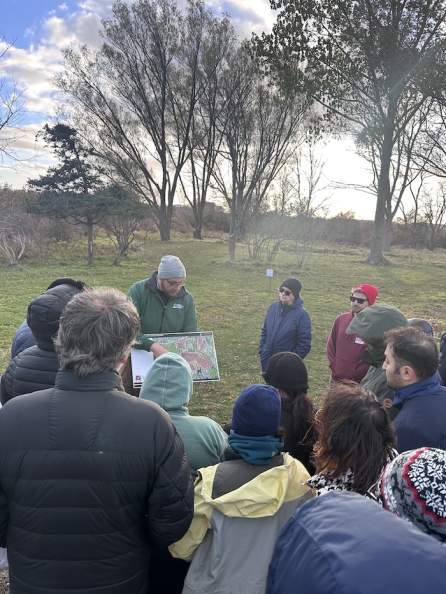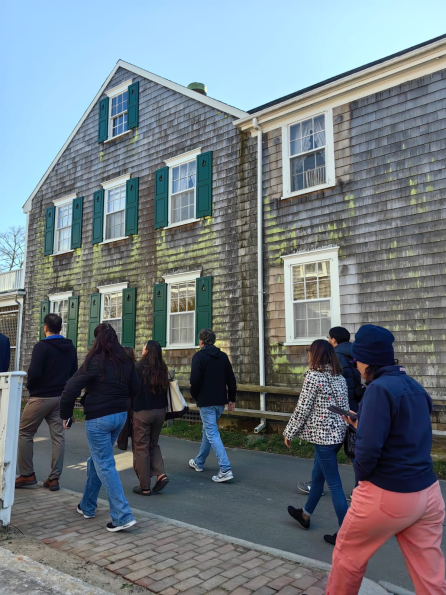After four weeks of dedicated research, the International Training Course on Climate Action for Sustainable Built Heritage Conservation and Management has come to a close.
Hosted on Nantucket by the Nantucket Historical Association (NHA), the course ran in partnership with ICCROM and Integrated Conservation Resources (ICR-ICC), and welcomed 11 participants from 10 countries, who engaged in a comprehensive curriculum, combining lectures, hands-on exercises, and site visits to address the intersection of climate adaptation and heritage conservation.
With over 28 expert-led sessions, the course emphasized the importance of understanding climate-related hazards, response frameworks, and adaptation strategies for conserving built heritage. Participants explored the direct impacts of climate change on heritage sites and developed tailored approaches for their preservation. The curriculum was designed to enhance the importance of understanding climate-related hazards, response frameworks and direct impact, as well as adaptation methods and trends that enable more informed climate predictions.
The Island of Nantucket served as a living laboratory, where participants could see the scope and scale of climate-related hazards and conservation across the island. Guided tours by local experts showcased the island’s historic downtown, wetlands, cranberry bogs, and coastal areas, illustrating the interplay between built and natural environments. These immersive experiences highlighted the tangible effects of erosion, sea-level rise, and shifting ecological conditions on heritage preservation.
With the historical and ecological perspectives covered, participants learned about various methods of adaptation and conservation. One example focused on the patterns of erosion and attempts to combat this in Sconset on the east end of the island through the use of geo-tubes and other measures. On the opposite end of the island, in Madaket, erosion threatens road access resulting in the relocation of residential housing, a common practice in Nantucket. Participants toured through the residential areas of downtown where they could directly understand the importance of traditional knowledge in conservation of historical methods of construction and conservation practice such as the creation and maintenance of the iconic cobblestone streets.
Divided into three groups, participants put their learning into action by conducting a preliminary area survey and analysis of the historic downtown. With this context established, each group carried out on-site structural and material analysis of three NHA properties: the Candle Factory, the Thomas Macy Warehouse and the Pacific Club (William Rotch Building).
Directly impacted by the changing climate, each building showed signs of deterioration due to factors related to rising salinity levels, ground water and sea level rise, and the increasing intensity of wind and rainstorms. Using the data they have collected as well as site-specific monitoring data that has been collected over the course of the previous year, participants presented their condition assessments and recommendations for climate adaptation and resilience.
Group projects focused on Nantucket sites, while individual case studies spanned diverse global contexts, from Sydney, Australia, to Kyoto, Japan, and Historic Bridgetown, Barbados. Each project showcased innovative approaches to mitigating climate-related hazards, demonstrating the universal relevance of the lessons learned on Nantucket.
This inaugural course also fostered a global network of professionals committed to advancing climate action for heritage conservation. Participants, already leaders in their respective fields, are now poised to share their knowledge and best practices within their communities and organizations. The success of the training underscores the importance of international collaboration in addressing the urgent challenges facing cultural heritage worldwide.
Looking ahead, organizers aim to expand the program and replicate its curriculum in future workshops, ensuring that the momentum generated in Nantucket continues to drive meaningful action for heritage resilience in the face of climate change. The greatest demonstration of the transmission of knowledge was through the application of each lesson learned in Nantucket, to the individual projects shared by the participants.



